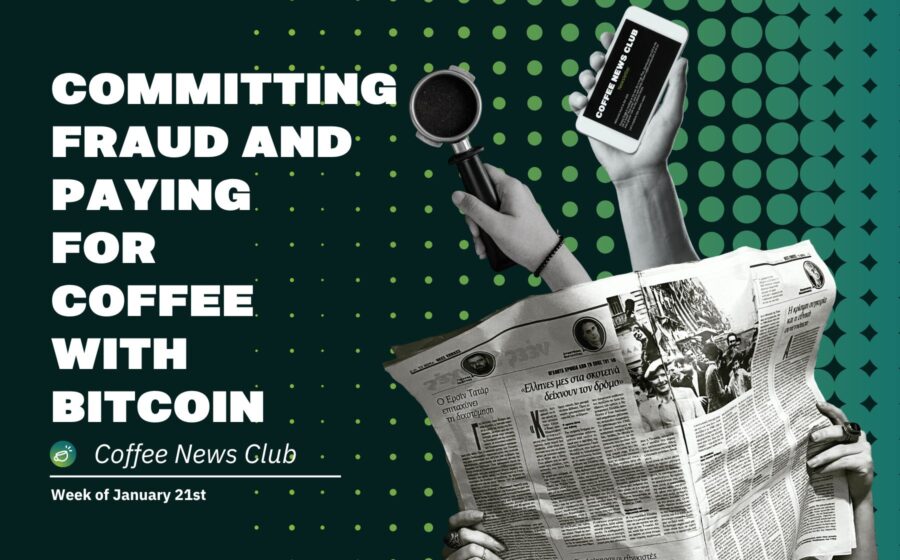Starbucks’ new policy: buy something or leave. Plus, the coffee community rallies to support those impacted by L.A. fires, and a Compass Coffee co-founder takes his allegations of fraud to court.
‘The Los Angeles Coffee Community Rallies Amidst The Impacts Of Historic Wildfires’ – via Sprudge
Wildfires have devastated parts of Los Angeles over the last two weeks, killing 27 and forcing hundreds of thousands of people to evacuate. The strong winds that fueled the blazes have weakened for now, and firefighters are regaining control over the worst fires. However, many residents cannot return to their homes or survey the damage.
L.A. has an extensive and celebrated coffee scene, and several cafes were destroyed or damaged by the fires. As Zac Cadwalader reports for Sprudge, many coffee professionals were also impacted, and the ash and toxic air meant that many cafes had to close. “It’s been unsafe to be outside with c02 levels and raining ash permeating into the cafes. At times it’s felt apocalyptic,” Dayglow’s founder Tohm Ifergan told Sprudge.
Coffee companies, locally and nationally, have stepped up to offer aid. Many L.A.-based shops are offering free food and drink to first responders or acting as donation drop-off points. Barista Magazine put together a list of coffee community resources for people seeking help—their list also features campaigns and fundraisers for folks who lost their homes and businesses in the fire. For more day-to-day updates, oat milk company Ghost Town Oats is sharing resources on their Instagram.
‘Buy Something or Leave, Starbucks Says’ – via BBC News
Earlier this month, Starbucks announced it would reverse its policy of letting people sit in stores or use its bathrooms without buying anything: now, patrons will be required to purchase something to sit in the cafe.
The company says the move is designed to prioritize paying customers and create a more welcoming environment. A spokesperson told the BBC that “these updates are part of a broader set of changes we are making to enhance the cafe experience as we work to get back to Starbucks.”
For months, Starbucks has been on a mission to recover its former “welcoming coffeehouse” vibes, part of new CEO Brian Niccol’s attempt to reverse the ailing brand’s fortunes. Over the past few months, Starbucks stores have reintroduced comfy seating, reduced the number of promotions and drink discounts, and pared down its sprawling menus. Starbucks has not detailed how kicking out non-paying customers will add to the welcoming atmosphere.
Starbucks stores previously adhered to a set of guidelines known as the “Third Place Policy.” Part of the policy allowed non-paying customers to hang out within Starbucks’ stores and use its bathrooms. It was introduced after a 2018 incident when two Black men, who were there for a business meeting, were arrested for trespassing at a location in Philadelphia. In the face of national outrage, the company apologized and closed 8,000 U.S. stores for “racial-bias education geared toward preventing discrimination in our stores.”
This is not the first time Starbucks has considered reversing its open bathrooms policy. Ex-CEO Howard Schultz said in 2022 that, “we have to harden our stores and provide safety for our people.”
For workers already dealing with understaffing and impatient customers, the new policy adds another potential point of conflict with patrons. “Who will have to enforce these changes? Mostly front-line baristas, working in understaffed stores, earning less than a living wage,” Starbucks Workers United wrote in an Instagram post.
‘Compass Coffee Co-Founders Split Amid Claim of Misspent Covid Funds’ – via Washington Post
Compass Coffee is often in the news due to its highly public and controversial union drive. But now, its leadership is under the microscope: Compass founder Harrison Suarez has filed a lawsuit accusing Michael Haft, with whom he co-founded the coffee brand, of fraud, breach of contract, and racketeering.
As reported by Spencer S. Hsu in the Washington Post, Suarez alleges that Haft, who is the current CEO at Compass, ran “a racketeering enterprise while defrauding Suarez of his share of the fair market value of the company under a signed operating agreement.” Additionally, Suarez alleges that Haft and his father misused millions of dollars in federal COVID-19 relief funds. Haft called the allegations “utterly untrue” in an emailed statement to the Post.
Suarez and Haft met at college. The two served together in the Marines before opening the first Compass location in 2014. The company quickly became a well-known specialty brand in the D.C. area, even serving coffee at the White House. Recently, workers at Compass moved to unionize, an effort that’s been highly contentious, particularly after organizers accused Compass leadership of hiring friends and family in an attempt to sway the union vote.
In the complaint, filed on January 13th, Suarez alleges that he believed the two to be equal partners but that Haft “secretly owned a larger share of the business from the very beginning, concealing his ownership interest behind a web of LLCs.”
Among other accusations, Suarez alleges that the Hafts obtained $10.5 million in federal relief funds but “used that money to prepay their own loans to Compass and make risky investments instead of using it solely for approved purposes such as paying workers, rent and other bills,” Hsu reports.
Among those investments, the lawsuit alleges, was an approximately $2.1 million investment in Bitcoin. Haft and Compass have actively promoted the cryptocurrency and blockchain technology in the coffee industry: the company launched a Bitcoin Blend in partnership with the Embassy of El Salvador, paid for green coffee using Bitcoin, and, in 2024, accepted cryptocurrency as payment at one of its cafes.
In his statement to the Post, Haft said that he had tried to “navigate these challenges in private” and had “made many offers to settle these matters amicably. I will continue to pursue a meaningful path of settlement in the hopes of finding resolution.”
More News
‘Costa Rica Coffee Launches Zero Deforestation Guarantee Program’ – via The Tico Times
‘National Coffee Association Talks Directly to Consumers Through aboutcoffee.org’ – via Daily Coffee News
‘Host Locations Have Been Announced For Four U.S. Coffee Championships’ – via Sprudge
‘5 Hot Coffee Innovations from CES – From Condensing Espresso Machines to Super-Fast Cold Brew’ – via TechRadar
‘Pope Francis Names Costa Rican Coffee Best in the World’ – via The Tico Times
‘There’s Not Enough Coffee At The Australian Open’ – via Sprudge
‘Dutch Bros Becomes Latest US Coffee Chain to Drop Non-Dairy Surcharge’ – via World Coffee Portal
The Week in Coffee Unionizing
Negotiations between Starbucks and its union have broken down, reports Michael Sainato for the Guardian. The two sides have been bargaining over a first contract for nearly a year, but with little progress made, Starbucks Workers United staged a nationwide strike in late December to pressure the company to negotiate.
For the last year, neither side has said much about how negotiations have been going, but now that the union is calling attention to the lack of movement, they’ve given more insights into the negotiation process. The union has called Starbucks’ economic and pay proposals “almost laughable.” They’ve specifically highlighted the discrepancy between barista pay and the multimillion-dollar salary of new CEO Brian Niccol.
“It comes off as a joke almost. My annual raise is going to come out to about 30 cents an hour,” said Chicago barista and bargaining representative Diego Franco. According to an analysis by John Foley in Reuters, Niccol’s pay—which Foley describes as “a potential $145 million package”—is roughly 10,000 times the median Starbucks barista salary (which Indeed puts at a little over $36,000 per year).
“I would love to see this company being able to pay us a livable wage,” Franco said. “I don’t think anybody should need to pick up multiple jobs to be able to make rent at the end of the month or be able to pay for groceries.”
Starbucks responded with criticism of the union’s pay demands. “Workers United proposals call for an immediate increase in the minimum wage of hourly partners by 64%, and by 77% over the life of a three-year contract. This is not sustainable,” a spokesperson told Sainato. While sales declined in 2024, the company brought in $36.2 billion in revenue over the year.
Starbucks Workers United filed an unfair labor practice charge in December, alleging that the company “refused to bargain and engaged in bad faith bargaining over economic issues.” They also said they’d stage more strikes if negotiations didn’t resume.
“As fun, large and meaningful as this first strike was, it was a warning shot,” said shift supervisor Mari Cosgrove. “There are more actions and more things coming, because we are not sitting on our thumbs, waiting for this contract to fall on our laps. We will get it.”
Meanwhile, workers at Fairgrounds Coffee in Milwaukee, Wisconsin, have unionized. Organizing began in November, with six of the seven employees signing union membership cards. The company’s owner, Chicago-based Infuse Hospitality, did not respond to the union’s request for voluntary recognition, so an election was scheduled—the union won 4-1.
“We have built a wonderful community here and unionizing provides the means to preserve that environment for future employees, too,” barista Abi Bean told the Milwaukee Journal Sentinel.
Beyond the Headlines
‘What Does It Mean To Label Coffee As ‘Healthy’?’ by Ashley Rodriguez
‘Rudy Giuliani and Our Uneasy Fascination with Celebrity Coffee Brands’ by Fionn Pooler
‘Column: For Coffee’s Survival, Researchers Must Prioritize Climate Change’ by Jonas Ferraresso






